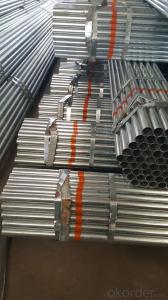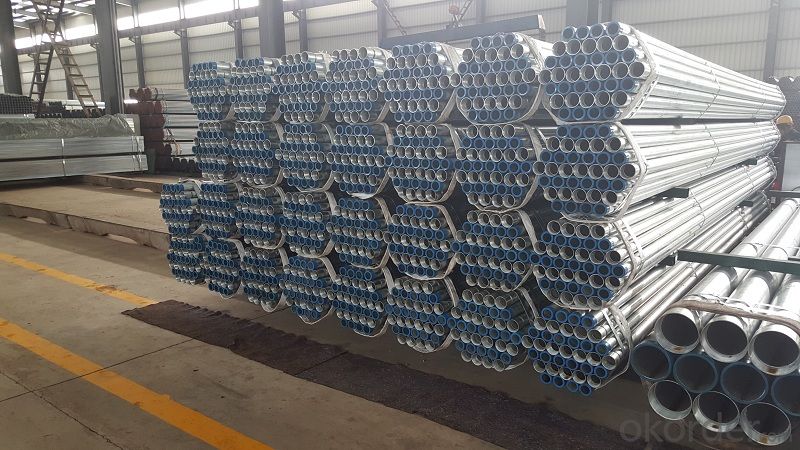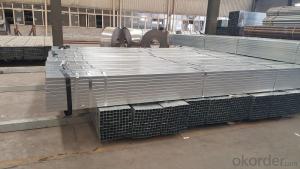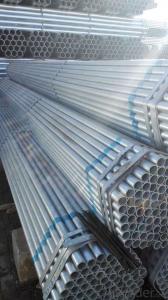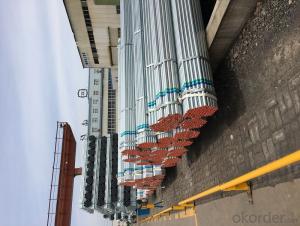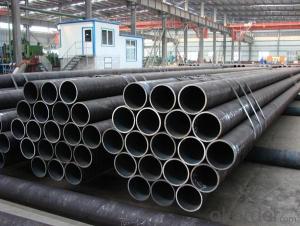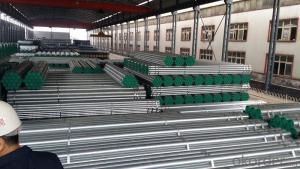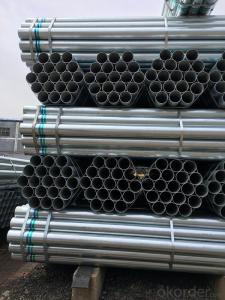Galvanized welded steel pipe for construction
- Loading Port:
- Tianjin
- Payment Terms:
- TT OR LC
- Min Order Qty:
- 10 m.t.
- Supply Capability:
- 12000 m.t./month
OKorder Service Pledge
OKorder Financial Service
You Might Also Like
Specification
1、Structure of Galvanized welded steel pipe for construction:
The surface of galvanized steel pipe welded steel pipe of hot dip galvanized layer or. Galvanized can increase the corrosion resistance of the steel tube, prolong service life. Galvanized pipe is widely used, in addition to water, gas, oil and other general low pressure fluid pipelines.
2、Main Features of Galvanized welded steel pipe for construction
• High manufacturing accuracy
• High strength
• Good visual effect
• Reasonable price
3、 Galvanized welded steel pipe for construction Specification:
Standard | GB, DIN, ASTM ASTM A106-2006, ASTM A53-2007 |
Grade | 10#-45#, 16Mn 10#, 20#, 45#, 16Mn |
Thickness | 1 - 33 mm |
Section Shape | Round |
Outer Diameter | 21 - 610mm |
Place of Origin | Tianjin, China (Mainland) |
Secondary Or Not | Non-secondary |
Application | Hydraulic Pipe |
Technique | Cold Drawn |
Certification | API |
Surface Treatment | factory state or painted black |
Special Pipe | API Pipe |
Alloy Or Not | Non-alloy |
Length | 5-12M |
Outer Diameter | 21.3-610mm |
Grade | 20#, 45#, Q345, API J55, API K55, API L80, API N80, API P110, A53B |
Standard | ASME, ASTM |
1) Material:Q195 Q235 Q345 X42 X52
2) Specification range:OD:21.3-610mm,WT:6-70mm,length:6-12m or according to the requirement of clients.
3) Excutive standards:GB,ASME API5L.ASTM A 106/A53,Despite of the above standards,we can also supply seamless steel pipe with standard of DIN,JIS,and so on,and also develop new products according to the requirements of our clients!
4、Packaging & Delivery
Packaging Details: | seaworthy package,bundles wrapped with strong steel strip |
Delivery Detail: | 15-30days after received 30%TT |
5、FAQ of Galvanized welded steel pipe for construction
①How is the quality of your products?
Our products are manufactured strictly according to national and internaional standard, and we take a test
on every pipe before delivered out. If you want see our quality certifications and all kinds of testing report, please just ask us for it.
Guaranteed: If products’ quality don’t accord to discription as we give or the promise before you place order, we promise 100% refund.
②Why should you chose us?
Chose happens because of quality, then price, We can give you both.Additionally, we can also offer professional products inquiry, products knowledge train(for agents), smooth goods delivery, exellent customer solution proposals.Our service formula: good quality+good price+good service=customer’s trust
SGS test is available, customer inspection before shipping is welcome, third party inspection is no problem.
6、 Galvanized welded steel pipe for furniture Images:
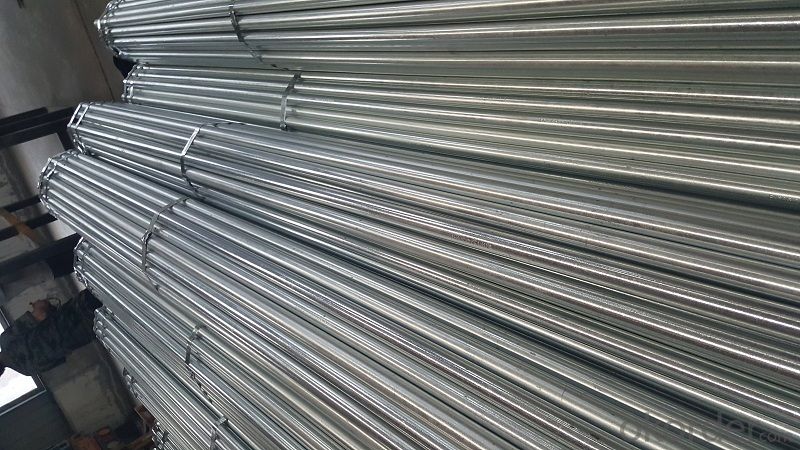
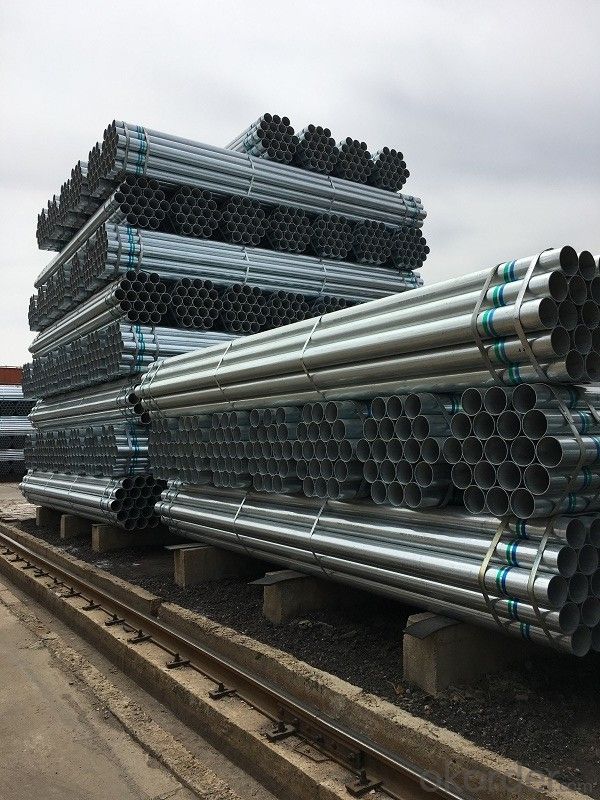
- Q: What does "steel pipe SC" mean?
- SC (run in welded steel duitconSC is the line laying mode GB letter of wire is worn steel pipe laying (welded steel pipe, low pressure fluid) SC70 said the conductor by low pressure fluid DN70 welded steel pipe as protection pipe laying, DN70 said the nominal pipe diameter is 70mm, the nominal pipe diameter is 70mm (a series of values, the actual diameter slightly different).
- Q: How do you select the right size of steel pipe for a project?
- To select the right size of steel pipe for a project, you need to consider factors such as the intended application, flow rate, pressure requirements, and structural integrity. It is essential to consult industry standards and guidelines, conduct engineering calculations, and seek professional advice to determine the appropriate pipe size that ensures optimal performance and safety for your specific project.
- Q: What are the industries that commonly use steel pipes?
- Some of the industries that commonly use steel pipes include oil and gas, construction, manufacturing, automotive, infrastructure, water treatment, and plumbing.
- Q: What are the factors that affect the lifespan of steel pipes in different environments?
- The factors that affect the lifespan of steel pipes in different environments include the presence of corrosive substances, such as chemicals or saltwater, which can corrode the steel and lead to degradation over time. Other factors include temperature fluctuations, which can cause expansion and contraction of the steel, leading to stress and potential cracking. The quality of the protective coating on the pipes also plays a role, as a strong and durable coating can provide better resistance against corrosion and prolong the lifespan of the pipes. Additionally, the maintenance and regular inspection of the pipes, including cleaning and repairs, can help identify and address any issues early on, preventing further damage and extending their lifespan.
- Q: What are the common applications of steel pipes in industrial settings?
- Steel pipes are commonly used in industrial settings for various applications such as transporting fluids and gases, providing structural support in construction projects, conveying materials in manufacturing processes, and facilitating the distribution of water, oil, and gas in pipelines.
- Q: Are steel pipes suitable for use in acidic environments?
- Yes, steel pipes are generally suitable for use in acidic environments. However, the specific grade of steel and the concentration of the acid should be considered to ensure proper corrosion resistance. Coating or lining the pipes with materials such as epoxy or rubber can also enhance their resistance to acidic conditions.
- Q: What are the different methods of joining steel pipes together?
- There are multiple techniques for connecting steel pipes, each with its own pros and cons. 1. Welding, the most commonly used method, involves heating and applying pressure to fuse the pipe ends. This creates a robust joint, but it necessitates skilled labor and specialized equipment. 2. Threaded connections involve threading the ends and using fittings to connect the pipes. This method is relatively simple and quick, but it may not be as strong as welding and can be prone to leakage if not sealed properly. 3. Flanged connections involve using flanges and bolts to connect the pipes. This allows for easy disassembly and reassembly, making it suitable for applications that require frequent maintenance. Flanged connections are also highly resistant to leakage. 4. Compression fittings involve compressing a ring or ferrule onto the pipe to create a tight seal. This method is straightforward and does not require heat or welding, making it ideal for applications where heat or sparks are prohibited. 5. Grooved connections involve cutting grooves into the pipe ends and using mechanical couplings to secure them. This method is fast, reliable, and allows for easy assembly and disassembly. Grooved connections are commonly used in fire protection systems. 6. Brazing, similar to welding, involves heating the pipe ends and adding filler material to join them. This method is often used for smaller diameter pipes and provides a strong joint, but it requires a high-temperature torch and skilled labor. Each method has its own advantages and is suitable for different applications. The choice of joining method depends on factors such as required strength, ease of installation, maintenance requirements, and pipe type.
- Q: What place must use galvanized steel pipe to make lighting line?
- Galvanized steel is widely used in construction, machinery, coal, chemical industry, railway vehicles, automobile industry, highway, bridge, container, sports facilities, agricultural machinery, petroleum machinery, prospecting machinery and other manufacturing industries.
- Q: How are steel pipes used in the shipbuilding industry?
- Steel pipes are extensively used in the shipbuilding industry for various purposes such as carrying fluids, gases, and other materials throughout the ship. They are used for the ship's plumbing systems, including water supply, drainage, and firefighting systems. Steel pipes are also used for the ship's ventilation and air conditioning systems, as well as for fuel and oil transfer. In addition, they play a crucial role in the construction of the ship's structural framework, providing strength and durability.
- Q: How do steel pipes perform in seismic zones?
- Steel pipes are commonly used in seismic zones due to their high strength and flexibility. They are able to withstand the dynamic forces and ground movements caused by earthquakes, offering excellent resistance to damage and deformation. The ductility and toughness of steel pipes allow them to absorb and dissipate energy during seismic events, reducing the risk of failure or collapse. Additionally, steel pipes can be designed and installed with proper reinforcement and connections to further enhance their performance in seismic zones.
Send your message to us
Galvanized welded steel pipe for construction
- Loading Port:
- Tianjin
- Payment Terms:
- TT OR LC
- Min Order Qty:
- 10 m.t.
- Supply Capability:
- 12000 m.t./month
OKorder Service Pledge
OKorder Financial Service
Similar products
Hot products
Hot Searches
Related keywords
